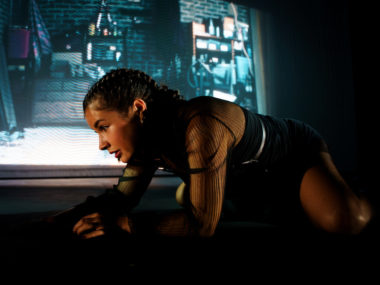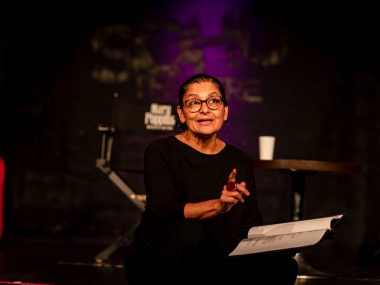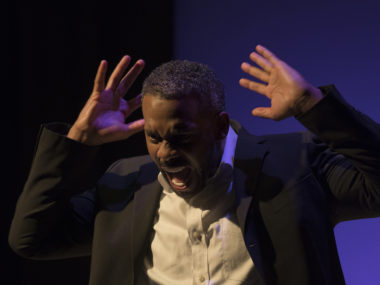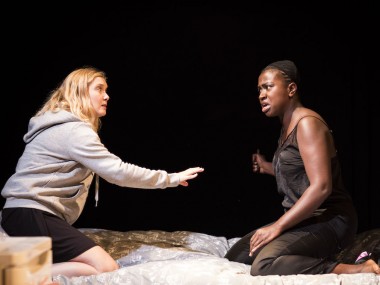Boy Parts, Soho Theatre
Thursday 26th October 2023
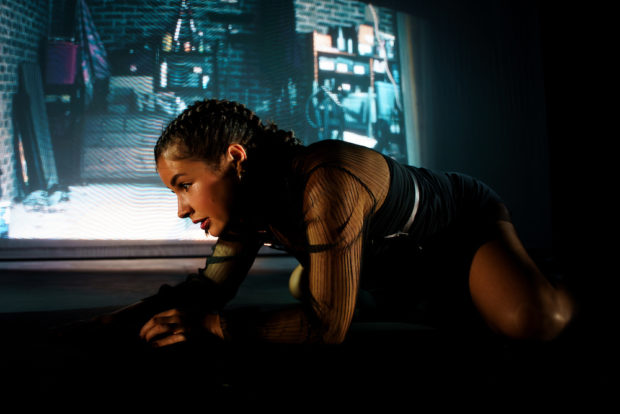
We’ve all heard of the male gaze, but what about its subversion? Overturning masculine dominance is one of the themes of Boy Parts, the acclaimed debut novel by Eliza Clark, first published in 2020 and now adapted as a monologue for the stage by Gillian Greer. Playing in the main space at the Soho Theatre (currently also expanding into Walthamstow) and co-produced with Metal Rabbit, both great advocates of the capital’s new writing, this psychological thriller features Aimée Kelly and raises some disturbing questions about gender stereotypes and the relationship between art and life.
The story concerns Irina Sturges, a mid-twenties photographer who after uni has returned to her home town of Newcastle and now works in a bar. This gives her the freedom to pursue her art, which involves scouting the streets for attractive young men (some of whom are underage) and staging erotic photo-shoots which often turn into sexual encounters and result in porno pics. She lives in a flatshare with Flo, her childhood friend, who puts up with her being in arrears with her rent, and tries her best to help when Irina goes on a binge or gets into trouble. When the hip Hackney Space in London offers to exhibit some of her photos, she is motivated to be more and more transgressive.
After thinking about “the female form in visual culture”, and how the male gaze is all about disempowering women, Irina builds up a portfolio of work which is all about subverting the hegemonic ways of seeing. Her models are men, young, vulnerable and not always beautiful, who are snapped in poses of subjugation, sometimes with a BDSM look, sometimes with hints of outright violence (a shard of glass embedded in an eye is one recurring image). Clearly, this dark art relates to Irina’s own past experiences, some trauma which is deliberately left vague, and her obsessive interest in sadism bleeds over into a desire to emulate serial killers.
But inversion is not the same as subversion. Although Irina upends the traditional binary of male villain and female victim — except for when she gets sexually assaulted — she merely succeeds in reproducing the misery of power relationships where the person behind the lens is stronger, more controlling, more powerful, than the model, who could just be a lad working at a Tesco checkout. So although Clark’s story, and Greer’s monologue, are good at articulating female rage, especially Irina’s anger about manipulative and exploitative men, their vision of an abusive and psychotic woman hardly offers a way out of gender norms or stereotypes.
Greer’s writing is a great mix of humour and ambiguity, having passages in which it is unclear whether Irina’s vivid descriptions of violence are her fantasies (mostly yes) or a memory of reality (at least once, surely). However, although this one-woman show gives voice to Flo and a dozen other characters, from male models to gallery owners, I’m not convinced that this is the best form for the story. What, for me, is missing is a fuller and more rounded version of Flo, to act as a counterbalance to Irina’s OTT persona. A two-hander might have given her a voice — instead we only see her through Irina’s biased eyes.
So although Irina is a powerfully feisty character, a deliberately unpleasant anti-heroine, she is also a classic unreliable narrator. While the agonised young female monologue is now, a decade on from Fleabag, in danger of being clichéd, and Boy Parts can’t quite shake off some clammy echoes of Bret Easton Ellis’s American Psycho, this show retains a distinctively Northern feel and quite an individual tone. Its ambiguity, its disturbing sense of a pleasure in inflicting pain, its competing feelings of trauma and transgression make the play worth watching, even if you can tick off its imperfections.
Sarah Joyce’s production, on Peter Butler’s dark bare set, is slick and efficient, with Kelly making good use of the space. Although this actor has a bright and friendly stage personality, which makes her switches into cruelty very effective, I have to say that I think she lacks the inner cold steel that is needed to make her the “frightening” “monster” stipulated by the text. Still, she’s watchable enough and the show is enhanced both by Hayley Egan’s video, which projects sinister scenes from Irina’s garage studio, and Joyce’s inclusion of cinematic elements, such as opening titles and a valedictory “The End” at the show’s, er, end. It’s a strong evening, but not a visceral one — it lacks a heart of darkness.
This review first appeared on The Arts Desk

